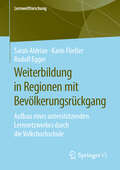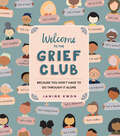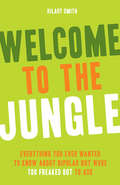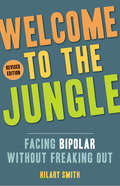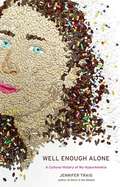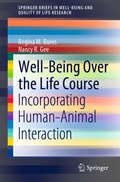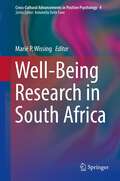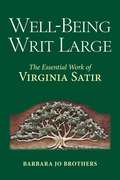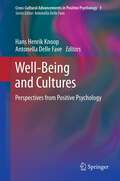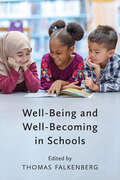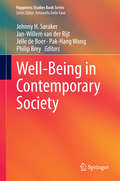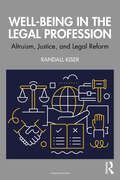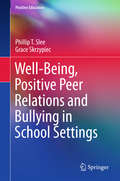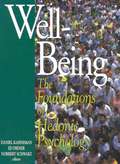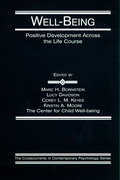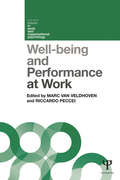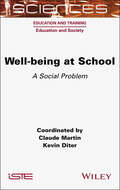- Table View
- List View
Weiterbildung in Regionen mit Bevölkerungsrückgang: Aufbau eines unterstützenden Lernnetzwerkes durch die Volkshochschule (Lernweltforschung #34)
by Rudolf Egger Sarah Aldrian Karin FließerIm vorliegenden Buch werden die Grundbedingungen für ein Lernen vor Ort am Beispiel zweier Regionen in der Steiermark beschrieben und mit demographischen und räumlichen Faktoren in Beziehung gebracht. Darauf aufbauend werden Möglichkeiten für ein erfolgreiches Lernen vor Ort in peripheren Regionen erarbeitet und die Rolle der Volkshochschule in den Regionen Südoststeiermark und Liezen analysiert.Der InhaltAufbau eines unterstützenden Lernnetzwerks für Menschen in peripheren Regionen • Regionsprofile • Bildungsgrundbedingungen in den Regionen Liezen und Südoststeiermark • Profil der Volkshochschule Steiermark • Die Rolle der Volkshochschule in den Regionen Liezen und Südoststeiermark • Lernen vor Ort – Herausforderungen und Möglichkeiten aus Sicht regionaler ExpertInnen • Gesellschaftlicher und regionaler Nutzen der Volkshochschulen in den Bezirken Liezen und SüdoststeiermarkDie Autorinnen und der AutorSarah Aldrian und Karin Fließer sind wissenschaftliche Mitarbeiterinnen am Institut für Erziehungs- und Bildungswissenschaft der Karl-Franzens-Universität Graz.Dr. Rudolf Egger ist Universitätsprofessor für Empirische Lernweltforschung und Hochschuldidaktik am Institut für Erziehungs- und Bildungswissenschaft der Karl-Franzens-Universität Graz.
Weiterbildungsmanagement in der Praxis: Psychologie des Lernens
by Urs Blum Jürg Gabathuler Sandra BajusWie können wir - auch zukünftig - Wissen vermitteln und Mitarbeitende in ihrer Entwicklung unterstützen? In diesem Buch erfahren Sie, wie Sie bei Ihrem Weiterbildungsmanagement lernpsychologische und neurowissenschaftliche Grundlagen nutzen und Lernprozesse erfolgreich gestalten können. Neben theoretischen Grundlagen erhalten Sie direkt umsetzbare Hilfestellungen in Form von Checklisten, Tipps und Fallbeispielen. Durch die enge Verzahnung von Wissenschaft und Praxis und das didaktisch ausgereifte Konzept mit Lernzielen am jeweiligen Kapitelanfang, wichtigen Kernsätzen sowie einer Schnellleseleiste können Sie die für Sie wichtigen Inhalte rasch extrahieren. So unterstützt Sie das Buch bei Ihren aktuellen Herausforderungen von Lernen und Lehren im betrieblichen Kontext. Die Zielgruppen: Das Buch richtet sich an Praktizierende in Learning & Development, an Trainerinnen und Trainer in der betrieblichen Bildung sowie an Fachpersonen, die mit Engagement Fachwissen weitergeben. Die Herausgebenden/das Autorenteam: Die Herausgeber Urs Blum, Jürg Gabathuler und Herausgeberin Sandra Bajus leiten als Dozierende den Bereich Ausbildungsmanagement am IAP Institut für Angewandte Psychologie an der ZHAW Zürcher Hochschule für Angewandte Wissenschaften. Sie engagieren sich in Weiterbildung und Dienstleistungsmandaten für eine wirkungsvolle und praxisorientierte Personalentwicklung. Alle Mitwirkende sind erfahrene Fachpersonen aus der Praxis, mit unterschiedlichen Perspektiven und Anwendungsfeldern. Hinweis: Weitere Bände vom gleichen Herausgeberteam widmen sich im Rahmen der Reihe Weiterbildungsmanagement in der Praxis den Learning Designs sowie der strategischen Ebene der Personalentwicklung und beinhalten somit zentrale Inhalte der angewandten Psychologie für die Personalentwicklung.
Welcome To My Country
by Lauren SlaterA psychologist's perceptions of mental illness which are illustrated with stories her patients have told her--privacy always protected.
Welcome to the Grief Club: Because You Don't Have to Go Through It Alone
by Janine KwohWelcome to the club that no one ever wants to join but so many of us end up needing. We&’re so sorry that you&’re here. Based on her own experience with grief—the author&’s partner died when both were in their late twenties—and those of other Grief Club members, Janine Kwoh uses brief writings, illustrations, and creative diagrams to explore the wide range of emotions and experiences that grief can encompass. For anyone who has lost a loved one or who is close to someone who is grieving, Welcome to the Grief Club is a book of solace, connection, hope, and reassurance. It addresses with empathy and honesty the aspects of grief that so many of us experience but that aren&’t widely discussed: the variety and volatility of emotions—sadness, anger, guilt, joy; the physical symptoms of grief; and how grief isn&’t linear, but it does change and soften over time. It affirms that there is truly no right or wrong way to grieve and assures us that the things we feel that surprise us or seem strange are often common and always valid. Humor helps us to survive, and the book uses a lighthearted approach to cover powerful topics, like supremely unhelpful things that people say to those who are grieving, grief trigger bingo, and everyday acts of resilience. This book is a companion that says, I see you and you are not alone, from one grieving person to another. It is a gentle reminder to give yourself permission to grieve for as long as—and in whichever ways—you need.
Welcome to the Jungle: Everything You Wanted to Know about Bipolar But Were Too Freaked Out to Ask
by Hilary SmithA Bipolar Guide from a Bipolar PersonWelcome to the Jungle has a greater focus on bipolar people, not the diagnosis: the ways in which each person can find his or her own way through the extreme emotional states and intense experiences that we are calling “bipolar”—whether that means medication or meditation, psychiatrists or vision quests, good sleep or good all-night dancing, or a little bit of everything.An honest, relatable book that can help you figure out how to live your life with bipolar disorder. Many bipolar books are too clinical, too alarmist, and too clearly written for family members and caretakers of people diagnosed with this mood disorder. Welcome to the Jungle is different. Author Hilary Smith wrote this guide because it is the book she wishes she'd been given when she was first diagnosed with bipolar disorder. It answers questions, points to resources, and most of all, comes from someone who understands what it’s like to be thrown off course by an overwhelming mental health issue—and what to do afterwards.Know that you are not alone—and that many paths can lead to healing. Just like for everyone else, there are many, many paths that bipolar people can take in life. Learn more about how to live your own life with a mental illness using the help of the insights in Welcome to the Jungle, which covers topics such as:Wrapping your head around triggers, causes of mood swings, medications, and therapistsRecovering from mental breakdowns, manic moments, and major depressive episodesLiving your life beyond the diagnosis—and helping your family to do the sameReaders of bipolar mental health books like The Bipolar Workbook, Rock Steady, or OMG That's Me! will love the devastatingly on-target, honest insights offered in Welcome to the Jungle.*This book is not intended to diagnose, treat, or prevent any illness or act as a substitute for advice from a doctor or psychiatrist.*
Welcome to the Jungle: Facing Bipolar Without Freaking Out
by Hilary SmithA Bipolar Guide from a Bipolar PersonWelcome to the Jungle has a greater focus on bipolar people, not the diagnosis: the ways in which each person can find his or her own way through the extreme emotional states and intense experiences that we are calling “bipolar”—whether that means medication or meditation, psychiatrists or vision quests, good sleep or good all-night dancing, or a little bit of everything.An honest, relatable book that can help you figure out how to live your life with bipolar disorder. Many bipolar books are too clinical, too alarmist, and too clearly written for family members and caretakers of people diagnosed with this mood disorder. Welcome to the Jungle is different. Author Hilary Smith wrote this guide because it is the book she wishes she'd been given when she was first diagnosed with bipolar disorder. It answers questions, points to resources, and most of all, comes from someone who understands what it’s like to be thrown off course by an overwhelming mental health issue—and what to do afterwards.Know that you are not alone—and that many paths can lead to healing. Just like for everyone else, there are many, many paths that bipolar people can take in life. Learn more about how to live your own life with a mental illness using the help of the insights in Welcome to the Jungle, which covers topics such as:Wrapping your head around triggers, causes of mood swings, medications, and therapistsRecovering from mental breakdowns, manic moments, and major depressive episodesLiving your life beyond the diagnosis—and helping your family to do the sameReaders of bipolar mental health books like The Bipolar Workbook, Rock Steady, or OMG That's Me! will love the devastatingly on-target, honest insights offered in Welcome to the Jungle.*This book is not intended to diagnose, treat, or prevent any illness or act as a substitute for advice from a doctor or psychiatrist.*
Welcome to the Show: A Mickey Tussler Novel, Book 3 (Mickey Tussler Series #3)
by Frank NappiIt’s 1950 and Mickey Tussler-the now-famous pitching prodigy with autism and a golden arm-is back for another baseball season in this third installment of Frank Nappi’s critically acclaimed Legend of Mickey Tussler series. Talk of Mickey’s legendary exploits on the field has grown since his improbable debut two years prior, as have the fortunes of Murph and the rest of the lovable ragtag Brew Crew. Now Mickey, Murph, and Lester find themselves heading to Bean Town to play for the Boston Braves.The call up is sweet, for all of them have overcome insurmountable odds to get where they are. But life in the major leagues is filled with fast-paced action both on and off the field. The bright lights of Boston hold a new series of challenges, hardships, and life lessons-especially for Mickey, who finds himself a long way from throwing apples into a barrel back on the farm. The three newest Braves have each other to lean on, as well as a new group of fans who are swept away by pennant fever, but balancing everything this new world has to offer may prove to be the greatest challenge of all.Sky Pony Press, with our Good Books, Racehorse and Arcade imprints, is proud to publish a broad range of books for young readers-picture books for small children, chapter books, books for middle grade readers, and novels for young adults. Our list includes bestsellers for children who love to play Minecraft; stories told with LEGO bricks; books that teach lessons about tolerance, patience, and the environment, and much more. While not every title we publish becomes a New York Times bestseller or a national bestseller, we are committed to books on subjects that are sometimes overlooked and to authors whose work might not otherwise find a home.
Well Enough Alone: A Cultural History of My Hypochondria
by Jennifer TraigA hilarious first-person account of life as a hypochondriac, as well as a look at the condition's history and broader cultural context, from the critically acclaimed author of Devil in the Details. The good news is Jennifer Traig does not have lupus, multiple sclerosis, Huntington's disease, Crohn's disease, or muscular dystrophy. She discovers that she does not have SUDS, the mysterious disorder that claims healthy young Asian men in their sleep, nor does she have Foreign Accent Syndrome, the bizarre but real neurological condition that transforms native West Virginians into Eliza Doolittle overnight. What she does have is hypochondria. Jenny Traig's inquiry into her ailment is not only an uproariously funny account but also a literary tour of hypochondria, past and present: the implied hypochondria of the Talmud, the flatulence-obsessed eighteenth century, and the malady's current unfortunate lack of a celebrity spokesperson. At the same time, Traig provides an intimate look at the complement of minor conditions that have concealed her essential health and driven her persistent self-diagnosis: the eczema, the shaky hands, and, worst of all, the bad hair. To her surprise, she ends her journey more knowledgeable than she was when she started out, a little less neurotic, and-one might say-healthier. Well Enough Alone is the definitive book on being worried well, in all of its gruesome and hysterical detail, from one of our funniest and most distinctive literary voices.
Well-Being Over the Life Course: Incorporating Human–Animal Interaction (SpringerBriefs in Well-Being and Quality of Life Research)
by Nancy R. Gee Regina M. BuresThis book provides a multidisciplinary overview of the impact of human–animal interaction on well-being from childhood to later life. It presents a life course perspective to the study of human–animal interaction, addressing concepts of family and the role of pets therein, as well as the impact of companion animals on child development and successful aging. This book fills a gap in the existing literature by framing the study of human–animal interaction, including the role of animal-assisted interventions on well-being, in a broader social and behavioral context.
Well-Being Research in South Africa
by Marié P. WissingThis is the first book to bring together examples of research in positive psychology / psychofortology conducted in the multi-cultural South African context with its diverse populations and settings. The volume reflects basic as well as applied well-being research in the multicultural South African context, as conducted in various contexts and with a variety of methods and foci. Theoretical, review, and empirical research contributions are made, reflecting positivist to constructivist approaches, and include quantitative, qualitative, and mixed-method approaches. Some findings support universality assumptions, but others uncovered unique cultural patterns. Chapters report on well-being research conducted in the domains of education, work, health, and family, and in clinical, urban vs. rural, and unicultural vs. multicultural contexts. Studies span the well-being of adolescents, adults, and older people, and topics include resilience in individuals, families, and groups, measurement issues and coping processes, the role of personal and contextual variables, and facets such as hope, spirituality, self-regulation, and interventions.
Well-Being Writ Large: The Essential Work of Virginia Satir
by Barbara Jo BrothersA comprehensive collection of Virginia Satir&’s research and teachings around the nature of humanity, author Barbara Jo Brothers has written the first ever tribute to the Mother of Family Therapy&’s life-work, capturing the essence of Satir&’s groundbreaking philosophies about the human race and the impact human&’s have on the Earth. In her career, the &“Mother of Family Therapy&” Virginia Satir strove to make life work better: for the individual, for families, for the entire world. With a training objective of &“becoming more fully human,&” Virginia believed that the principles for peace within families could be extrapolated to peace within the &“world family.&” Having formulated her groundbreaking philosophies from her clinical observations of hundreds of families in multiple countries, Virginia&’s practices continue to impact the world at large, spreading peace and understanding. More than just a testament to Virginia&’s legacy, Well-Being Writ Large is a window into her thinking—a &“biography&” of a deeper understanding of the nature of the human being and how that human being might live better in her or his world. Author, licensed clinical social worker, and Virginia scholar Barbara Jo Brothers has painstakingly researched and drawn from Virginia&’s works—including books, articles, interviews, and transcribed lectures—personal notes made over the course of Satir&’s career, and direct conversations during Brothers&’s own extensive residential training to compile the most complete, most essential collection of Virginia Satir&’s work.
Well-Being and Cultures
by Hans Henrik Knoop Antonella Delle FaveThis anthology focuses on empirical studies comparing cultures in relation to central positive psychological topics. The book starts out with an introductory chapter that brings together the main ideas and findings within an integrative perspective, based on a broad theoretical framework encompassing interdisciplinary and methodological issues. It gives special emphasis to some open issues in the theory and assessment of culture-related dimensions, and to the potential of positive psychology in addressing them. The introductory chapter is followed by two chapters that examine theoretical approaches and instruments developed to assess happiness and well-being across cultures. Following that examination, five chapters are devoted to the relationship between well-being, cultures and values. The second half of the book prominently investigates well-being across cultures in the light of socio-economic factors. This book shows that positive psychology, now officially well into its second decade, is providing still finer-grained perspectives on the diversity of cultures along with insights about our shared human nature, uniting us for better or worse.
Well-Being and Success For University Students: Applying PERMA+4
by Stewart I. Donaldson Jana KociWell-Being and Success for University Students: Applying PERMA+4 is grounded in the science of well-being and positive psychology and teaches students how to strengthen their health and well-being, as well as to make their study journey more enjoyable and successful. Higher education has changed dramatically during the last few years, and given the massive growth of mental health challenges among students, universities and faculty have recognized the need to help students to strive, not only survive. Universities have a great potential and responsibility to promote the well-being of their students. This book provides students with information, motivation, and skills to build their own unique well-being and helps colleges to produce more well-being in the university culture. Students and faculty will be introduced to PERMA+4, an evidence-based framework for enhancing well-being and positive functioning, including academic performance. This book emphasizes practical applications of findings from the best available research to have students learn several steps they can take to strengthen their well-being and academic performance. Individual chapters talk about popular topics of positive psychology such as positive emotions, engagement, relationships, meaning, achievement, physical health, mindset, environment, and economic security. Each chapter summarizes the knowledge on specific topics, invites students to assess their well-being in the particular life domain, and encourages them to explore and try activities and evidence-based interventions to learn how to care for their own mental and overall health. This book not only serves as a guide for students but also as a useful tool for professors seeking to enhance their courses and programs with well-being promotion and student wellness centers across the world.
Well-Being and Well-Becoming in Schools
by Thomas FalkenbergBy its very nature, school education is concerned with student well-being. Written by Canadian education scholars from a Manitoba-based research group, Well-Being and Well-Becoming in Schools aims to develop the notion that what we wish for our children is their well-being and well-becoming as they live their lives. This collection brings education scholars together to focus on a timely topic that has been of rapidly increasing interest to the research and education communities: student well-being and flourishing schools. Contributors address a broad range of issues that arise from this position to create a rich and integrated understanding of the topic. Chapters focus on foundational issues, conceptual issues, socio-cultural and organizational issues, and pedagogical and curricular issues. Ultimately, Well-Being and Well-Becoming in Schools weaves together substantial ideas to create an integrative framework that will not only serve as a guide for further research, but also for school educational leaders and educators to implement the idea of making school education primarily about student well-being.
Well-Being in Adolescent Girls: From Theory to Interventions
by Elena Savina Jennifer M. MoranThis book equips school psychologists and other mental health professionals with a comprehensive understanding of mental health and well-being in adolescent girls. The text places adolescent girls in a developmental and social-cultural context and outlines factors that can shape girls’ well-being including family, peers, and media. Chapters discuss trajectories that might result in mental distress and dysfunction in adolescent girls and identify pathways to their optimal development. Additionally, the book reviews the domains of well-being including physical health and habits, emotional well-being, healthy relationships, and identity and agency. Each chapter includes theory-informed and empirically supported interventions to help promote girls’ positive physical and socio-emotional development and culminates in a list of further recommended resources for the reader. Well-Being in Adolescent Girls is a valuable resource for school psychologists, counselors, and other mental health professionals working with adolescents along with those in graduate-level courses in school psychology and school counseling programs.
Well-Being in Contemporary Society
by Jan-Willem Van der Rijt Johnny H. Søraker Jelle Boer Pak-Hang Wong Philip BreyThis anthology examines the practical role of well-being in contemporary society. It discusses developments such as globalization, consumerism and the rapid innovation and use of new and emerging technologies and focuses on the significant impact of these developments on the well-being of people living today. The anthology brings together researchers from various disciplines, including psychology, economics, sociology, philosophy and development studies. It provides concrete insight on the role and importance of well-being in contemporary society, using a mix of empirical grounding, philosophical rigour and an emphasis on real-world applications. It is unique in that it seeks to understand the relation between well-being research and its application towards real problems.
Well-Being in the Legal Profession: Altruism, Justice, and Legal Reform
by Randall KiserThis book provides a critical psychosocial analysis of legal practice, documenting a mental health crisis among lawyers and judges and linking this crisis to a dysfunctional legal system they continue to control.Tracing studies of lawyers and judges over 40 years, this book demonstrates that decades of mental distress and social detachment in the legal profession have seriously damaged the legal system. Focusing largely on conditions in the United States but also drawing on studies from the UK, Canada, Germany, and Australia, the book depicts how this system is jeopardized by lawyers’ egocentrism, depression, anxiety, suicidal ideation, and substance abuse. To improve the legal system and lawyers’ mental health—integrating law, psychology, sociology, and policy making—the book advocates a renewed commitment to justice, compassion, respect, and fairness through an ethic of regenerative altruism.This book will appeal to legal academics concerned with the sociology of legal practice, as well as those involved in training lawyers; it will also be of interest to practicing lawyers, judges, and others engaged by issues of social justice and legal reform.
Well-Being, Positive Peer Relations and Bullying in School Settings
by Phillip T. Slee Grace SkrzypiecThis book focuses on well-being at school in association with positive peer relationships and bullying. Taking an integrative and community-based approach, the book outlines the significance of student-school relationships for well-being and emphasizes the importance of school and classroom climate for promoting well-being. Embedded in research and theory, the book reflects the belief that all of our dealings with children and young people in whatever role, whether as parent or teacher or in some other capacity, are bounded by theory, either implicit or explicit. The book highlights the role of partnerships and linkages in addressing school-based well-being and anti-bullying programs. It pays special attention to the barriers and facilitators that schools must address in engaging with external agencies to deliver strong evidence-based initiatives. The international concern with school bullying is given particular consideration in relation to its impact on the well-being of all involved. A feature of the text is the focus given to the implementation of programs into the busy and complex world of schools and classrooms recognizing that the effectiveness and impact of any school-based program is strongly related to the quality of its implementation. The text reflects a commitment of the authors to a broad-based systemic view of development, taking into account family, school, community and culture as influential factors. The text incorporates a number of pedagogical features e. g. classroom based activities and discussion starters, reflections on points raised in the text, and case studies. This book is of special interest to teachers, school counselors, educational psychologists and mental health professionals working in school settings.
Well-Being: Foundations of Hedonic Psychology
by Daniel Kahneman Norbert Schwarz Edward DienerThe nature of well-being is one of the most enduring and elusive subjects of human inquiry. Well-Being draws upon the latest scientific research to transform our understanding of this ancient question. With contributions from leading authorities in psychology, social psychology, and neuroscience, this volume presents the definitive account of current scientific efforts to understand human pleasure and pain, contentment and despair. The distinguished contributors to this volume combine a rigorous analysis of human sensations, emotions, and moods with a broad assessment of the many factors, from heredity to nationality, that bear on our well-being. Using the tools of experimental science, the contributors confront the puzzles of human likes and dislikes. Why do we grow accustomed and desensitized to changes in our lives, both good and bad? Does our happiness reflect the circumstances of our lives or is it determined by our temperament and personality? Why do humans acquire tastes for sensations that are initially painful or unpleasant? By examining the roots of our everyday likes and dislikes, the book also sheds light on some of the more extreme examples of attraction and aversion, such as addiction and depression. Among its wide ranging inquiries, Well-Being examines systematic differences in moods and behaviors between genders, explaining why women suffer higher rates of depression and anxiety than men, but are also more inclined to express positive emotions. The book also makes international comparisons, finding that some countries' populations report higher levels of happiness than others. The contributors deploy an array of methods, from the surveys and questionnaires of social science to psychological and physiological experiments, to develop a comprehensive new approach to the study of well-being. They show how the sensory pleasures of the body can tells us something about the higher pleasures of the mind and even how the effectiveness of our immune system can depend upon the health of our social relationships.
Well-Being: Positive Development Across the Life Course (Crosscurrents in Contemporary Psychology Series)
by Corey L. M. Keyes Marc H. Bornstein Lucy Davidson Kristin A. MooreThis volume derived from original presentations given at a conference in Atlanta, Georgia, under the auspices of the Center for Child Well-Being. Scholars, practitioners, public health professionals, and principals in the child development community convened to address a science-based framework for elements of well-being and how the elements might be developed across the life course. Integrating physical, cognitive, and social-emotional domains, Well-Being is the first scientific book to consider well-being holistically. Focusing on a set of core strengths grouped within these three domains, the book also includes a fourth section on developmental strengths through adulthood that broadly examines a continuum of health and development, as well as transitions in well-being. This volume takes a developmental perspective across the life course, describing foundational strengths for well-being--the capacities that can be actively developed, supported, or learned. These foundational strengths--problem solving, emotional regulation, and physical safety--are the positive underpinnings of early child health and development, as well as ongoing well-being across the life course. Working together and blending their respective disciplinary perspectives and expertise, 53 experts in psychology, sociology, child development, and medicine have contributed to the book.
Well-Grounded: The Neurobiology of Rational Decisions
by Kelly LambertA neuroscientist reveals unique aspects of decision making and the best strategies for protecting and enhancing the brain’s ability to navigate life’s uncertainties Contingency calculations—the ability to predict the outcomes of decisions and actions—are critical for survival and success. Our amazing brains continually process past and current experiences to enable us to make the most adaptive choices. But when the brain’s information systems are compromised—by such varying conditions as drug addiction, poverty, mental illness, or even privilege—we can lose the ability to arrive at informed decisions. In this engaging book, behavioral neuroscientist Kelly Lambert explores a variety of the modern factors that can lead to warped neural processing, or distorted realities she terms “brain bubbles.” Individuals who define success in terms of creature comforts and immediate gratification, for instance, may interact less with the physical and social world and thereby dull their ability to imagine varied contingency scenarios. The author underscores how continuous, meaningful, and well-grounded experiences are required if we are to make the best decisions throughout our lives.
Well-being and Performance at Work: The role of context
by Marc Van Veldhoven Riccardo PecceiPsychology has been interested in the well-being and performance of people at work for over a century, but our knowledge about both issues, and how they relate to each other, is still evolving. This important new collection provides new understandings on what it means to work productively while also feeling happy, socially related and healthy. Including contributions from a range of international experts, the book begins with a conceptual framework for understanding both concepts, before showing how a variety of different contexts, both organizational and personal, impact upon well-being and performance. The book includes chapters on specific job roles, from creative work to service positions, as well as the importance of HR policies and how the individual worker can determine their own well-being and performance. Also featuring a chapter on researching this fascinating area, Well-being and Performance at Work will be essential reading for all students and researchers of organizational or occupational psychology, HRM and business and management. It is also hugely relevant for any professionals interested in the productivity and well-being of their organizations.
Well-being and Wellness: Psychosocial Risk Management
by Tony Boyle Fiona CharltonWell-being and Wellness: Psychosocial Risk Management is a companion to Health and Safety: Risk Management that describes the techniques and background knowledge for preventing injury and ill health in the workplace. The new book instead describes the techniques and background knowledge for preventing impairment of worker well-being and wellness.These techniques differ from those required for the prevention of injury and ill health because of the need to take into account individual differences in susceptibility to psychosocial risk sources, and the fact that psychosocial risk sources can provide opportunities as well as threats. The book is divided into two parts: Part I describes the required background knowledge, including the nature of psychosocial harms to individuals, what can trigger these harms, and what can be done to mitigate these harms, and also deals with the necessary psychological background and the role of individual differences in reactions to psychosocial risk sources. Part II describes an outline psychosocial management system based on the ISO 45001 specification and the guidance in ISO 45002 and ISO 45003. However, the nature of the psychosocial risk sources being dealt with means that the ISO 45001 requirements must be extended in a number of ways, for example, by having threat and opportunity assessment, rather than risk assessment.Written primarily for OH&S professionals who wish to extend the scope of their management system to include well-being and wellness issues, the book is also directly beneficial to human resources (HR) professionals who have the responsibility for managing psychosocial hazards such as bullying and harassment. Additionally, it can be understood and applied by managers in all sectors who want to improve the well-being and wellness of their team, and it will be a relevant reading for students on OH&S, HR, or management courses.
Well-being at School: A Social Problem (ISTE Consignment)
by Claude Martin Kevin DiterIn recent decades, children’s well-being, particularly at school, has become a major political and academic issue that has gained importance both in public policy and in the social sciences. Well-being at School uncovers and discusses the different ways in which school well-being has been defined and evaluated, by outlining the international and interdisciplinary state of the art. It presents recent and diversified empirical evidence in different European and non-European countries, which bring together perspectives that have often been arbitrarily and artificially opposed in the literature: objective well-being versus subjective well-being; adult-centered perspective versus child-centered perspective; and analysis of family determinants versus analysis of school determinants of child well-being. This book’s originality lies in simultaneously considering the multiple dimensions of children’s well-being at school and understanding how these different determinants interact and combine, depending on the (geographical, social and family) contexts in which the children live.
Wellbeing and Schooling: Cross Cultural and Cross Disciplinary Perspectives (Transdisciplinary Perspectives in Educational Research #4)
by Venka Simovska Carole Faucher Ros McLellanCollectively, the research presented in this book revisits, challenges, and rearticulates taken-for-granted wellbeing conceptualisations, policies and intervention frameworks, as critical discussion of wellbeing in relation to children and young people from a variety of socio-cultural, political, and economic settings is still relatively sparse. The contributions work synergistically to generate a sophisticated understanding of children’s wellbeing while introducing fresh and context-sensitive approaches. Pre-conceived and taken-for-granted notions of wellbeing are problematised through four sections in (i) Re-examining conceptualisations of wellbeing in educational research and policy; (ii) Focusing on School environments, schooling, and wellbeing; (iii) Examining the significance of cultural contexts; and (iv) Amplifying children's voices. The objective is to help generate new ways of researching and thinking about wellbeing and schooling, that transcend monocultural, monodisciplinary and monomethodological strategies. The book aims to stimulate further theoretical and empirical research, as well as development of effective policies and school interventions which nuance rather than reduce complexity of both education and wellbeing.
